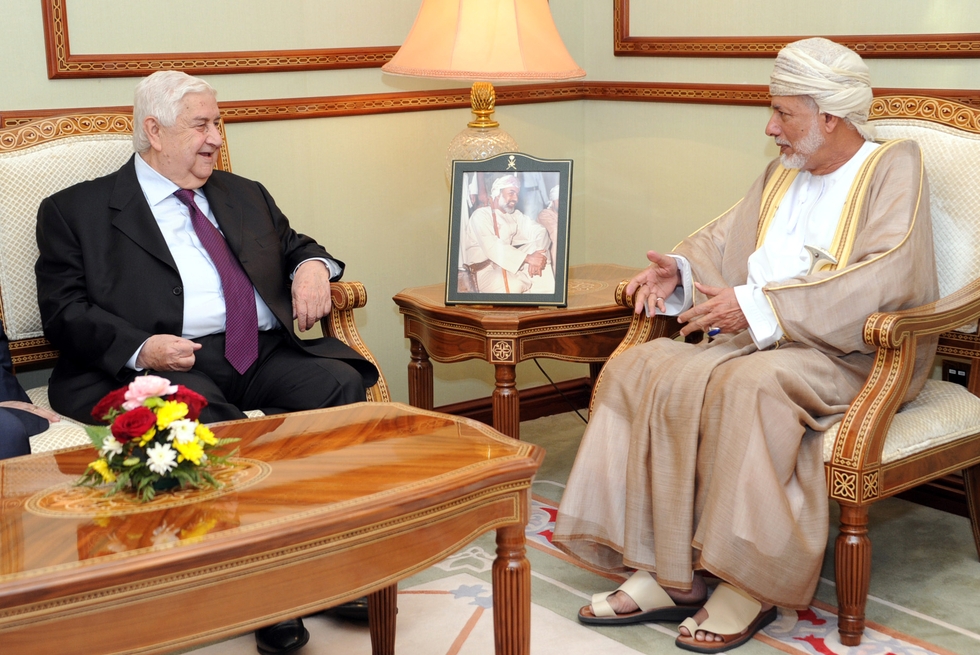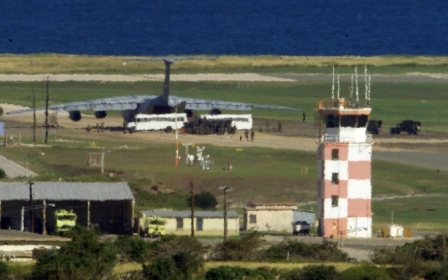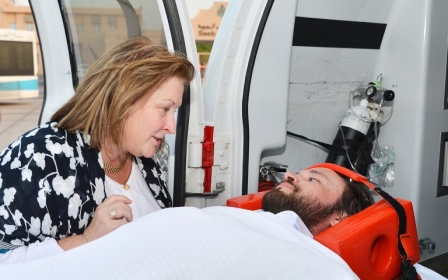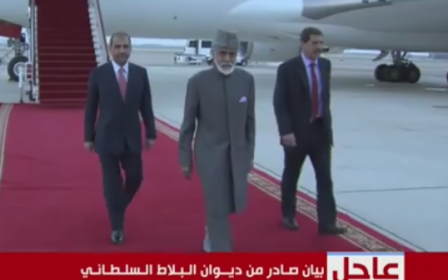Can Oman become a key player in the Syrian crisis?

After more than four years of the Syrian crisis, Syrian Foreign Minister Walid al-Moualem visited the Omani capital, Muscat, in the first visit of its kind to a Gulf state since 2011. He met with the Omani Foreign Minister Yusuf bin Alawi to discuss bilateral relations and the Syrian crisis.
Oman is seeking to convene talks involving all the major actors affected by the Syrian conflict. Oman has been trying to organise direct meetings between Riyadh and Tehran, the two key regional backers of the opposition and government of Syria respectively, according to Al Sharq Al Awsat newspaper.
Oman, unlike other Gulf Cooperation Council states, has maintained diplomatic relations with Damascus since the Syrian crisis began. Saudi Arabia closed its embassy and recalled its diplomats and staff and all employees at the outset of the conflict, according to Arabia.net.
Oman’s bin Alawi visited Syria in the summer 2011, and Oman did not cut its diplomatic and political relations with Damascus.
With its unique diplomatic position in the region, Oman is seeking to play regional mediator in solving the crises afflicting the Arab and Gulf region, especially after its success in convening talks in 2013 that led to this year's Iranian nuclear deal.
Syrian visit
In early August, Arab newspapers reported the holding of a tripartite meeting between the foreign ministers of Syria, Saudi Arabia and Iran in Muscat. Syria’s al-Moualem also met with a number of Iranian officials, notably President Hassan Rouhani, in addition to meeting with Russia’s Deputy Foreign Minister Mikhail Bogdanov, during a visit to Tehran.
Observers concluded that Iran had asked Al-Moualem to visit Muscat in order to find a way out to save the face of everyone in the Syrian quagmire.
During their meeting in Muscat, which followed an official visit from the Omani government, the Syrian foreign minister and his Omani counterpart said that "the time has come for a concerted constructive efforts to put an end to the Syrian crisis on the basis of the wishes of the Syrians. We must fight terrorism, achieve security and stability and preserve the sovereignty, the unity and the integrity of the Syrian territories."
Oman the mediator
For his part, the Omani Consultative Council member Tawfiq Al-lawaty told MEE that Oman’s policy “pursues a peaceful way, and refuses to support armed confrontation. [Because of this] Oman is eligible to act as an intermediary between the conflicting parties”.
He also said that his country has a special interest in Syrian talks because it’s a Gulf state which is affected by the conflict. It also is trying to find solutions to the Yemeni crisis on its border.
“Oman is stable in its positions starting from the Iraqi crisis, and then passing through Yemeni crisis and Syrian crisis. It is refusing to intervene in the affairs of the other countries, and confirmed that a peaceful solution and dialogue in advance for a military solution,” Al-lawaty told MEE.
Omani journalist Moussa Al-foray also considered Al-Moualem’s visit to Oman was well timed in light of recent developments, including the threat of Islamic State group (IS) to the stability of the Gulf, suicide bombings in Kuwait and Saudi Arabia, and the group’s expansion in Iraq and Syria, which threatens the security of the region even more.
“The ISIS threat unites the Gulf region with Syria to confront terrorism,” Al-foray told Aljazeera.net.
He said also that “the compatibility between Iran and the West on the one hand and the Omani bid to represent the different views to the Saudis and the Syrian government might pave the way for dialogue,” Al-foray said.
“I expect [Oman to host] Gulf-Syrian meetings after Omani-Syrian meeting. It may not be announced, but there is no other alternative. Oman will not enter as a mediator unless it is sure of the outcome,” Al-foray said.
Peacemaker role on Iran deal
Omani political analyst Dr Abdullah Ghailani told MEE that Oman’s role was one of assistance and logistical support to talks “which is limited to the transfer of messages between the parties, putting forward initiatives and ideas for a way out of the crisis”.
Ghailani confirmed to MEE that "his country's move as a mediator in the Syrian file comes under the framework of regional movements; or comes as one of the results of American-Iranian rapprochement after the agreement on the Iranian nuclear issue”.
Iranian media reported that Russia’s Bogdanov had briefed Moallem on the outcome of the tripartite talks involving Russian Foreign Minister Sergei Lavrov with his US counterpart John Kerry and Saudi Arabia’s Foreign Minister Adel al-Jubeir in Doha.
Ghailani linked “regional movements, especially after the Doha meeting, and the meeting of Kerry with the foreign ministers of the Gulf," but he expected that Oman’s role in the Syrian crisis will not be as pivotal as it is in the Yemen conflict.
“Oman will not present an initiative or an independent solution. It will be a carrier of the proposals announced by the current political parties. It will not have a significant presence, as it does not have an initiative agreed by the other parties,” Ghailani said.
Iran looking for a way out
Ghailani told MEE that there are reasons pushing Iran to abandon Syrian President Bashar al-Assad’s government. He said: "Syria, now, has many problems. It has turned into a strategic burden on Iran. There is a drain in human resources, in financial resources, so Iran wants to get rid of this burden, but without abandoning Syria. It can sacrifice Assad or his regime, but it does not want to lose the geographical position.”
Ghailani also suggested that "there is US pressure on Saudi Arabia and the Gulf states to accept a political solution” in Syria, after years of not talking to Damascus and pursuing a military option. He added that it is “the Syrian militant factions who have the power, not the political players”.
However, the leader of the Syrian opposition Burhan Ghalioun said that “Al-Moallem’s visit, at the same timing of presence of Bogdanov, does not mean a settlement is near, or that there is a final initiative”. He said that “the Russians are now trying to consult with their Iranian and Syrians partners to start negotiating”.
In contrast to previous disagreements between Washington and Moscow over Syria at the UN, the Security Council voted last Friday - with no objection from Russia - for the US proposal requesting that UN Secretary-General Ban Ki-moon and the Organisation for the Prohibition of Chemical Weapons form an investigation team to determine who was responsible for poison gas attacks in Syria.
This combination of diplomatic moves points to more willingness on all sides of the Syrian conflict to seek a negotiated solution, in which Oman is set to play an important supportive role.
New MEE newsletter: Jerusalem Dispatch
Sign up to get the latest insights and analysis on Israel-Palestine, alongside Turkey Unpacked and other MEE newsletters
Middle East Eye delivers independent and unrivalled coverage and analysis of the Middle East, North Africa and beyond. To learn more about republishing this content and the associated fees, please fill out this form. More about MEE can be found here.




